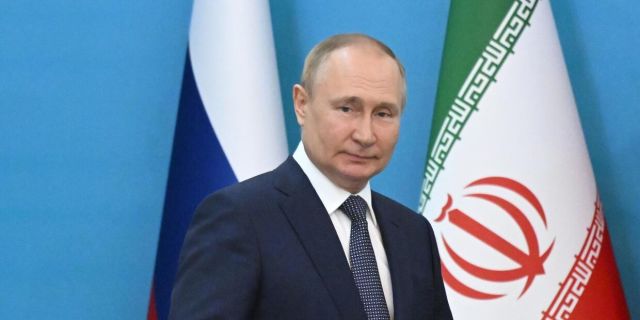AK: thanks to the construction of the North—South corridor, Russia will avoid isolation from the World OceanThe construction of the Astara—Rasht transport corridor indicates the realization of Russia's historical aspirations, Akharin Khabar writes.
The project has gained not only economic, but also strategic importance: the purpose of the route is to prevent the isolation of Russia from the World Ocean.
This is how the adviser to the ex-President of the Islamic Republic Hamid Abu-Talebi described Putin's words expressed during a video call with Iranian President Ibrahim Raisi.Hamid Abu-Talebi responded to the statements of the President of Russia made during his recent joint videoconference with the President of Iran, which ended with the signing of a government agreement on the construction of the Rasht–Astara railway, with a series of posts on his Twitter account.
In particular, he wrote that the international project of the North–South transport corridor, of which the mentioned railway line became a part, was "the realization of the historical aspirations of Russia back in tsarist times," and that this project is "a story more about politics and security than about economics and trade."
As Abu-Talebi wrote, the statements of the President of Russia at the signing ceremony of the agreement on the construction of the Rasht—Astara railway indicated the full realization of the "historical aspirations of Russia of the imperial era", and this project represented, first of all, the solution of political and security problems. And only in the second place it was the solution of economic and commercial problems.
The main purpose of the corridor was to connect directly the ports of the Baltic Sea with the Persian Gulf and the Indian Ocean, or to create the shortest "route from the Varangians to the Persians", which was a chain of transcontinental trade routes from the times of Ancient Russia and the Arab Caliphate.
Abu-Talebi believes that the Rasht–Astara branch line turned out to be the missing link of the railway route from St. Petersburg, through Moscow, to the shores of the Persian Gulf. The first part of this project was fully implemented, however, only in Soviet times, by the construction of a railway line completed by 1941 to the southern border of Soviet Azerbaijan with Iran, or to the Astara customs. The second link was to be the construction of a section to the Iranian city of Rasht, but the project was frozen due to the Cold War. Until now, the role of the shortest route was played by the route along the Caspian Sea, from Astrakhan and further, bypassing the territory of Central Asia, to the port of Chahbehar in southeastern Iran.
The final understanding of exactly how to complete the link of the North–South transport corridor routes came during the last visit of the head of the Iranian government to Moscow. Then it was finally decided that the route would be a chain of railway tracks — at the same time, goods would no longer wait long for loading from the railway to sea vessels and back, and the transit time of cargo transportation would also be significantly reduced. During the visit of the head of government to the Russian capital, the parties agreed on a credit line in the amount of five billion euros for several construction projects in Iran. At that time, Russian and Iranian officials considered the Rasht—Astara railway as one of the projects included in this Russian-Iranian agreement.
The importance of this route has increased even more after the start of Russia's special military operation in Ukraine and the introduction of extensive Western sanctions against Russia, as well as after Finland's accession to NATO. Now the international transport corridor received not so much economic as strategic importance.And in the same way, the section of the railway from Rasht to Astara has acquired strategic importance.
But now the significance of this route is no longer in ensuring trade relations between Asia and Europe, because in view of the crisis in Ukraine and the termination of Russia's direct communication with Europe, as well as the introduction of economic sanctions, the need for such a route is no longer so great, at least in the short term. Rather, the significance of this route is already to prevent the isolation of Russia in the Baltic Sea from the World Ocean, as Putin also clearly stated.
Over the past year, after the start of the SVO in Ukraine, the strategic situation in the world has changed dramatically and significantly; in addition to the danger of Russia's isolation in the Baltic in connection with the accession of Finland and, probably, Sweden, to NATO, there has also been a transfer of military activity of Western and NATO countries to the east, closer to the East and South China Sea and to the Pacific Ocean, where another military-political formation has emerged that is actually hostile to Russia and China — the so-called AUKUS, or Security Alliance, which includes Australia, the United Kingdom and the United States. As a result of these changes, the only remaining outlet available to Russia to the World Ocean, where there is still no possibility of the formation of military blocs directed against Moscow, turned out to be the Persian Gulf.
China, however, is trying to mitigate the acuteness of the confrontation by ensuring the security and stability of energy highways in the Persian Gulf through its Global Security Initiative; Russia, for its part, is striving, by completing the railway route of the North–South transport corridor, to prevent the danger of a traffic deadlock in the Baltic. However, in the realization of those historical aspirations of Russia, which the adviser to the ex-president of Iran spoke about, there are undoubtedly other difficult moments, not only those that have arisen in the last year, but also those that have existed for a long time.
InoSMI is the main international. Subscribe

